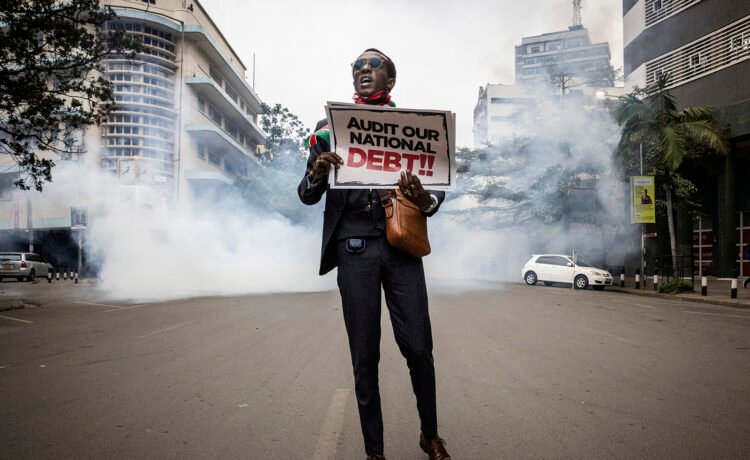NAIROBI, Kenya (RNS) — African faith leaders are calling for debt forgiveness as the Vatican’s 2025 Jubilee year approaches to help their countries tackle growing economic crises.
“We urgently need a new debt jubilee to bring hope to humankind, and to bring the planet back from the brink of becoming uninhabitable,” said 27 religious leaders from 13 countries, addressing the G20, G7, United Nations, IMF and World Bank in a July 19 statement.
Participants in the Kigali, Rwanda, meeting included representatives from the Catholic Church as well as Anglicans, Lutherans, other Protestants, Muslims and both interfaith and national councils of churches. The clergy are frontline witnesses to the rising costs of living, wars, vulnerable health care systems, climate change, pandemic impacts and other economic challenges that are stirring discontent across the continent. The faith leaders said their countries face “agonizing choices” between spending on their own people and paying their creditors.
“Unfortunately, inequities in the international tax, financial and trading systems, together with gaps in domestic governance, continued to foster unsustainable debt,” the statement said.
The Catholic Church observes Jubilee every 25 years as a period of forgiveness and reconciliation, though Pope Francis ushered in an “extraordinary Jubilee Year of Mercy” in 2015. The Vatican officially declared 2025 the year of Jubilee in May this year. The celebration will begin with the ceremonial opening of the Holy Door of the St. Peter Basilica on Christmas Eve 2024 and ends in December 2025.
Africa’s debt is at its highest level in over a decade. Countries have taken even more debt with mounting pressures from inflation, COVID-19 and the Russian invasion of Ukraine.
Africa’s external debt reached an estimated $1.2 trillion by the end of 2023, according to the African Development Bank, about 23% of Africa’s GDP in 2022 and 140% of its exports, making servicing the debt increasingly difficult. This year, Africa is expected to pay $163 billion to service its debt, compared with $61 billion in 2010.
While the Trump administration declared debt relief to Africa unhelpful, advocating for foreign investment projects from the U.S., President Joe Biden has advocated for creditor nations to reduce high debt burdens and help provide better financing terms through international financial institutions. Both administrations have sought to counter China’s influence in the region.
The faith leaders point to the preceding Jubilee Year in 2000, when a coalition for debt forgiveness successfully freed $130 billion in debt relief in 38 countries and reduced poverty, they say.
“While we have moved forward critical debt relief and aid, we still need improvements in debt relief and aid processes,” said Eric LeCompte, executive director of the religious development organization Jubilee USA Network and a co-organizer of the convening of African leaders. “If we had the debt policies and institutions religious leaders called for 25 years ago, we would have tools to help address the climate and poverty crises.”
Those policies include improved access to permanent, rules-based processes that bind creditors into debt reductions and lower the costs of international crises such as the COVID-19 pandemic response to limit suffering in developing nations.
“We are calling for debt cancellation with clear demands for appropriate mechanisms to ensure the cancellation is not abused by recipient nations,” the Rev. Lesmore Ezekiel, a Nigerian Lutheran who is the head of programs at the All Africa Conference of Churches, told Religion News Service.
According to Sheikh Ibrahim Lethome, a Kenyan Muslim scholar, African countries entered this state of indebtedness because they have mismanaged the borrowed money.
“When we mismanage resources, we end up with this problem,” Lethome, a participant in the meeting, told RNS. “We have taken a debt. We have to service this debt, but when you look at the way this money was spent, there is nothing to show for it at all.”
Lethome, the legal adviser of the Supreme Council of Kenya Muslims, said there could have been a carefully thought-out strategy before a country borrowed money and fell into debt.
He believes countries should now try to obtain interest-free loans. “For example, the Islamic mode of lending,” he said. “It’s like a partnership. It’s like an investment.”
The statement ends with a call to the international community.
“You have the power and the responsibility to steer (lending) in the path that restores hope and renewal,” the faith leaders said.















